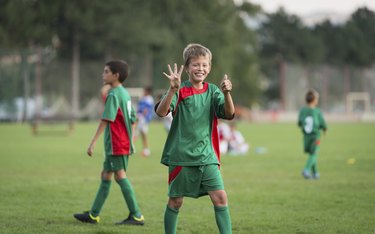
Competitive sports require a high degree of energy. As you run, kick and otherwise perform during game play, blood rushes to your hardworking muscles. Your body converts glycogen stores into energy to extend your performance. If you haven't prepared for the game properly, your glycogen stores become low and you may not play to the best of your ability. Preparing a few days in advance means you have optimum energy to play and win on game day.
Step 1
Rest during the day before your game. Using up your body's energy stores through excessive training the day before could lead to a lower level of energy. While you needn't rest completely, stick to low-intensity workouts that don't tire your muscles or deplete your energy stores so you're ready for your game.
Video of the Day
Step 2
Eat a dinner based on complex carbohydrates the night before the game. Complex carbs help increase glycogen stores, so your body has more to draw upon when you engage in sports. Avoid refined carbs, which include sugary cereals, white bread and sugar-based treats. Those cause a quick burst of energy followed by crash and fatigue. Instead, sweet potatoes, whole wheat pasta, fruit and legumes are better choices to help increase energy.
Step 3
Eat breakfast on game day. When choosing your foods, remember that complex carbohydrates give energy, while protein helps you feel full and satisfied. Incorporate both in a breakfast burrito or oatmeal and yogurt so you continue to feel satisfied throughout the day. Even if your game is in the evening, a good breakfast is a solid foundation upon which to build other meals.
Step 4
Pack a snack to eat before the game and during the game, if necessary. As you play, you deplete your energy stores at a rapid rate. You need both calories and carbohydrates to help replace your burned energy. Crackers and cheese or fruit and yogurt make excellent, light snacks to help you stay energized.
Step 5
Drink plenty of water as you play. One of the earmarks of dehydration is sudden fatigue and decreased performance. You lose water through sweat as you play, which is why drinking at least 7 to 10 oz. of water for every 10 to 20 minutes of exercise is necessary. Sports drinks contain carbohydrates and potassium to replace depleted levels in the body, but are really only necessary if you plan to play for more than 90 minutes.
Warning
Never rely on caffeinated energy drinks for sports performance,. While they may help you feel temporarily energized, the energy from complex carbohydrates is longer-lasting and will not cause a sudden decrease in energy when the effects wear off.
Video of the Day